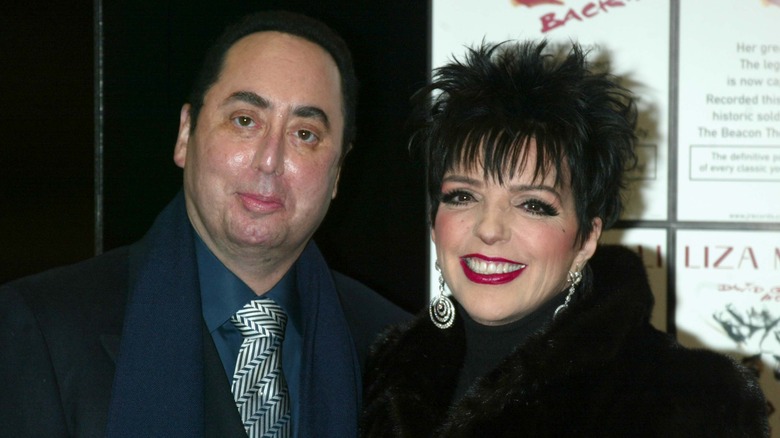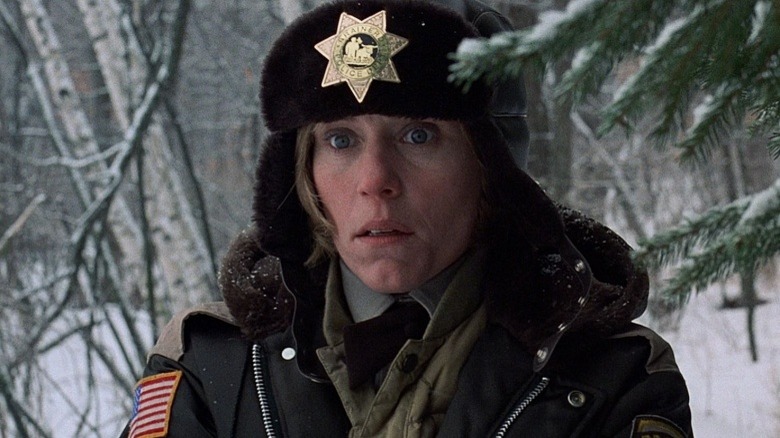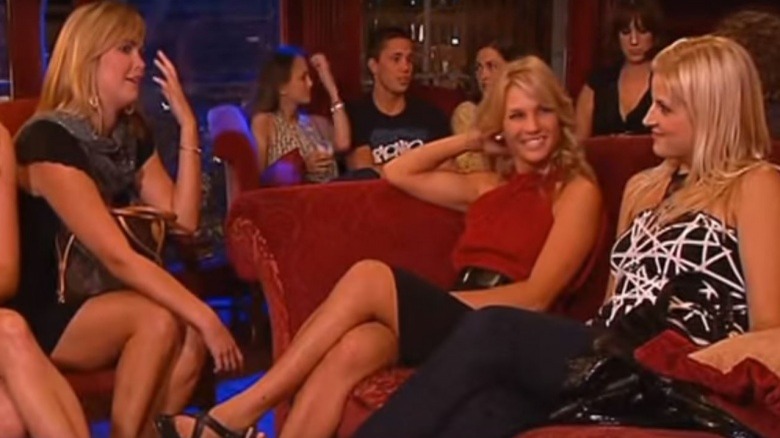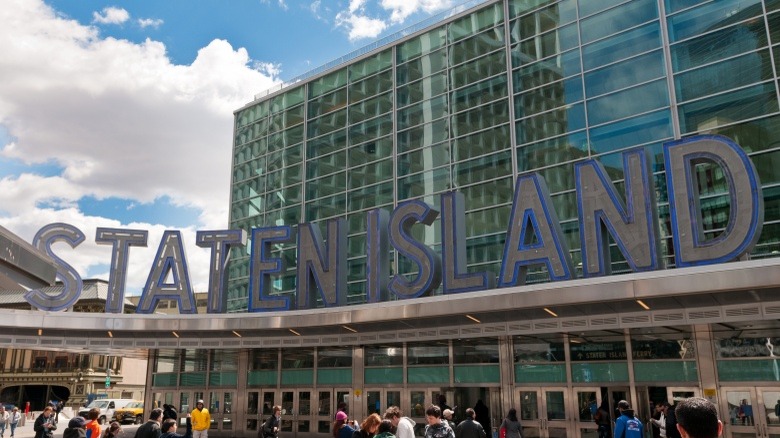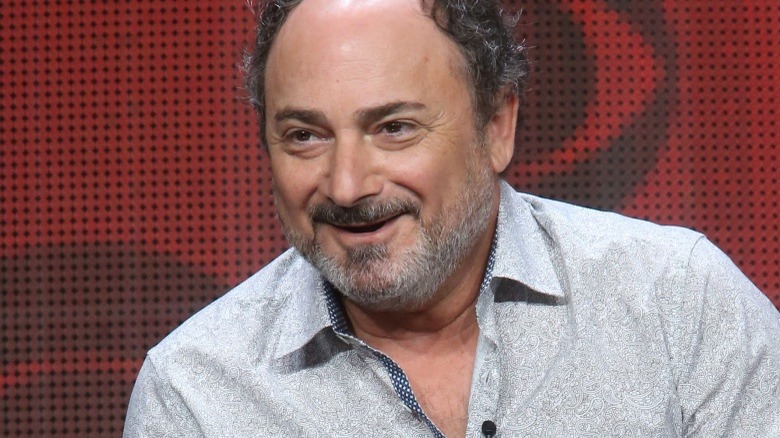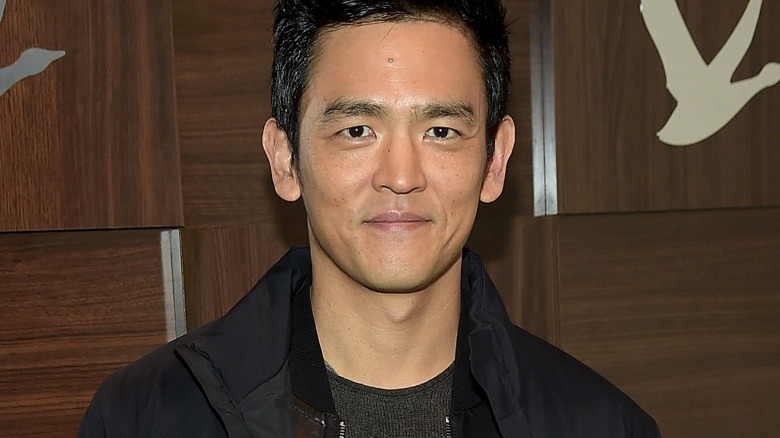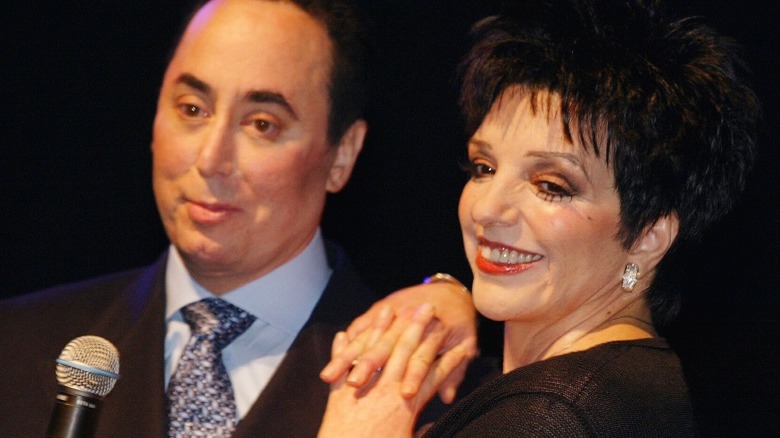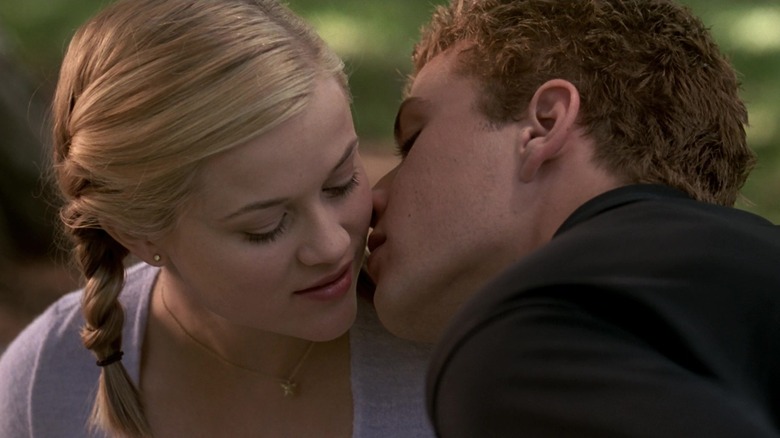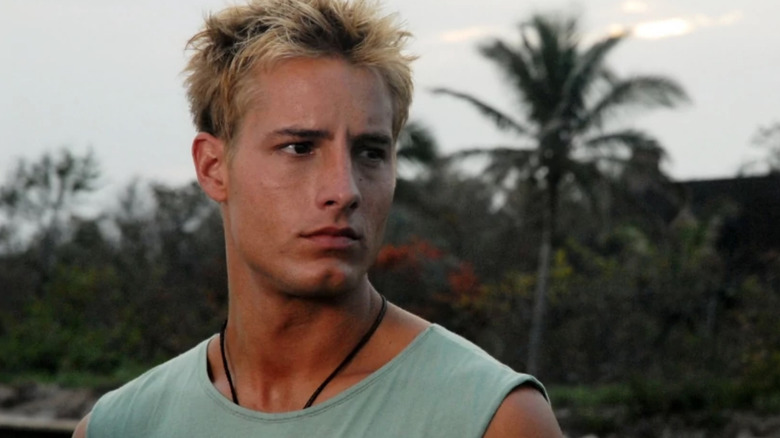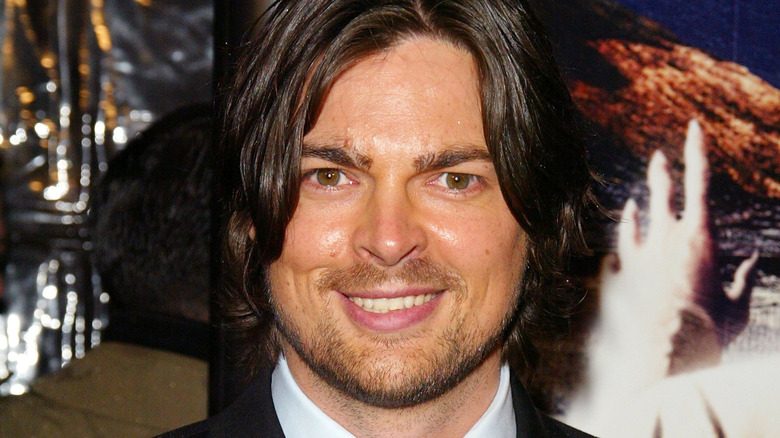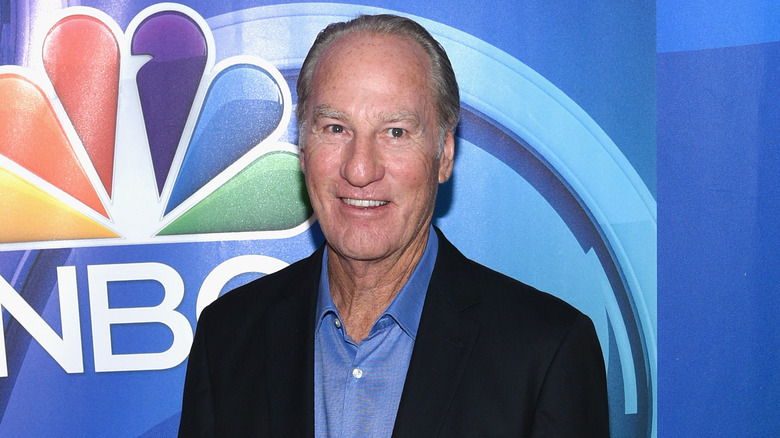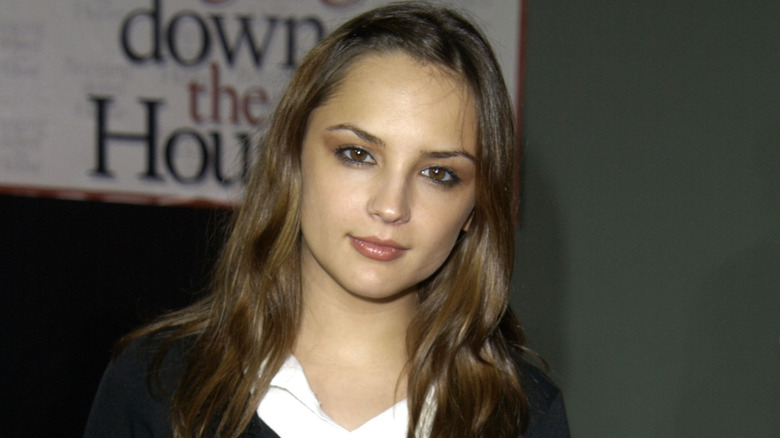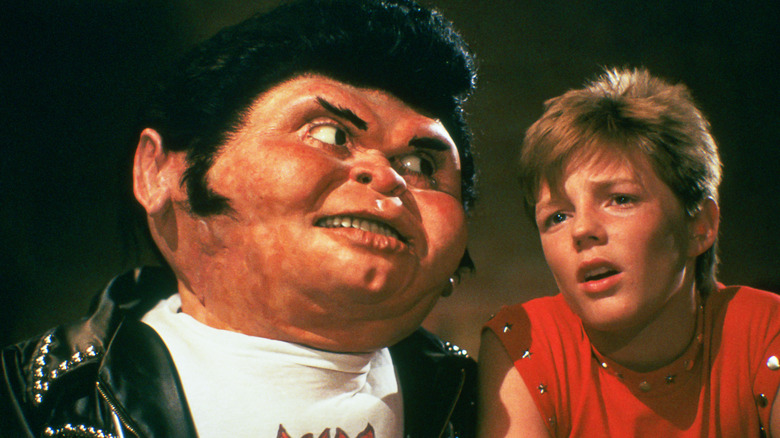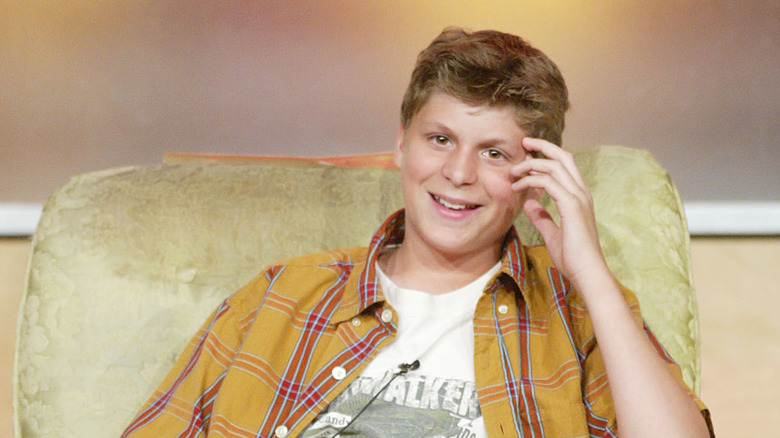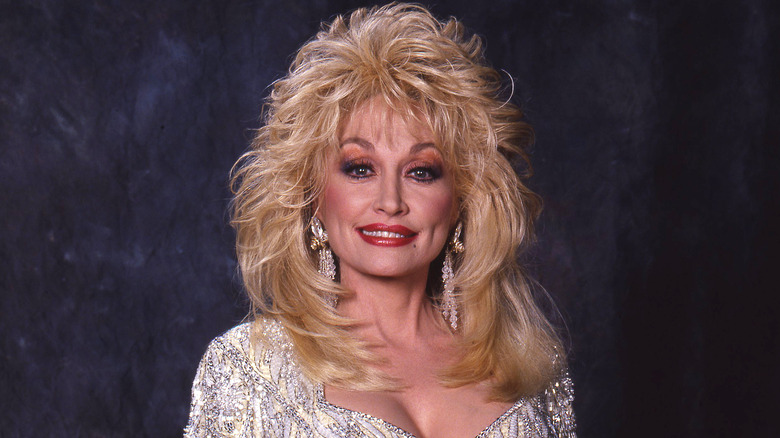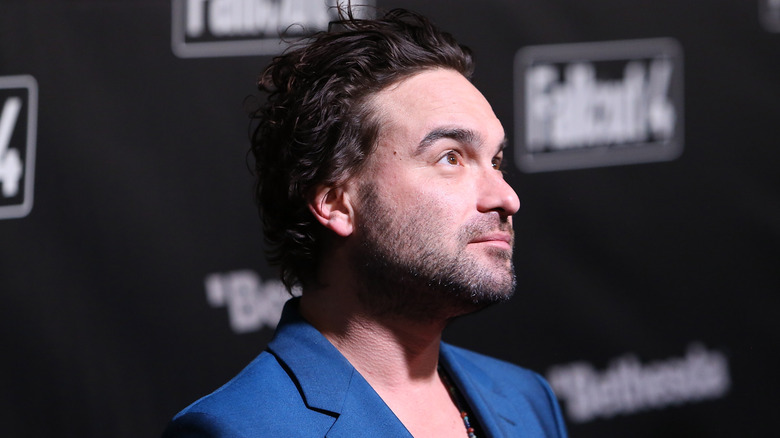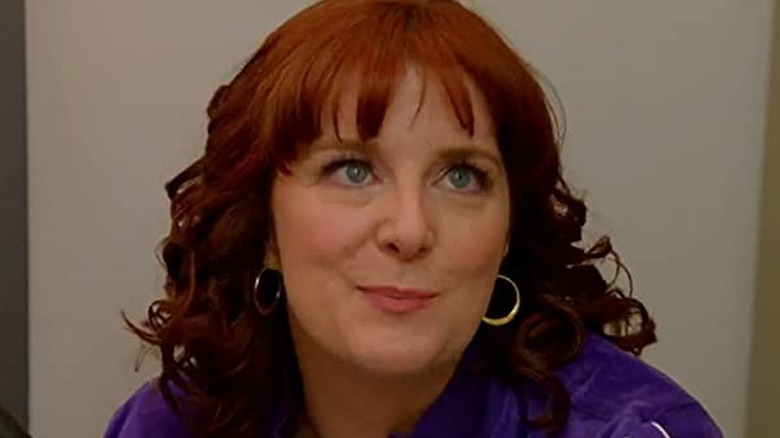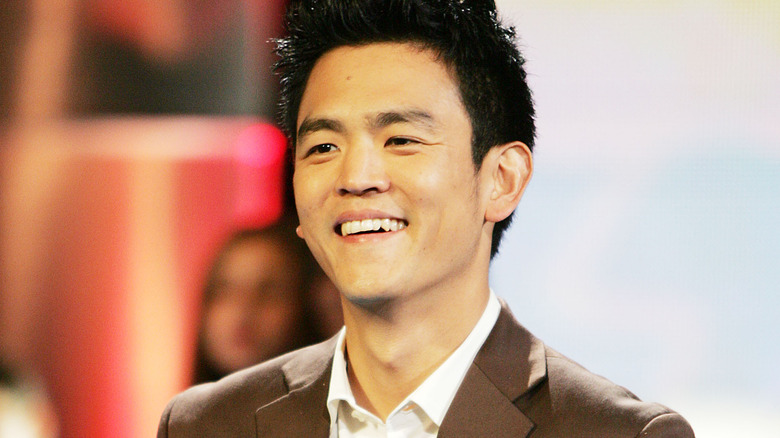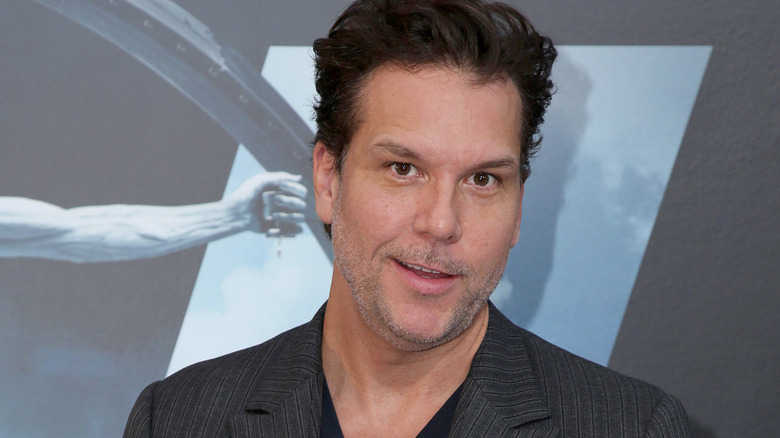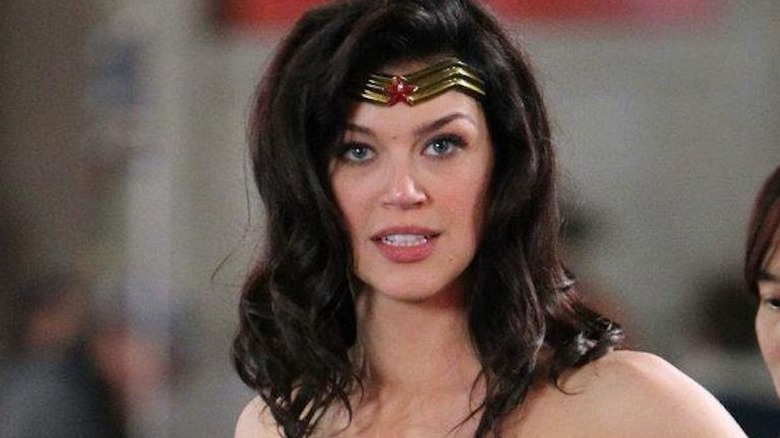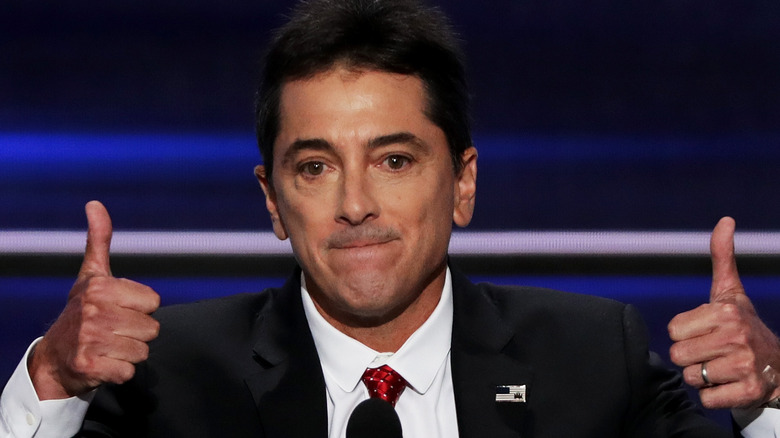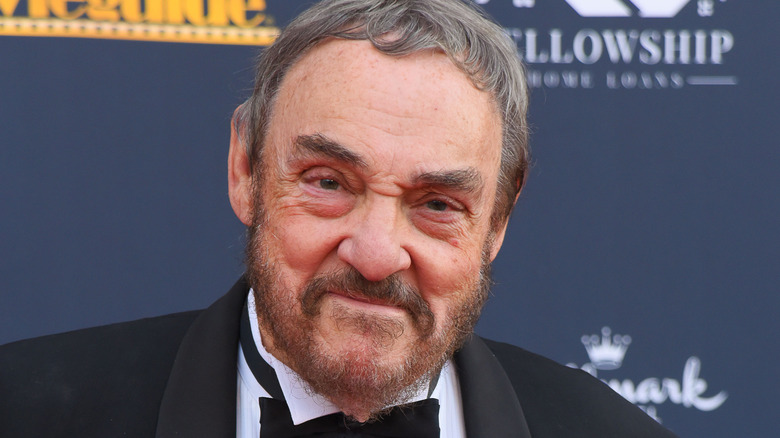Terrible TV Shows That Never Made It To Air
We may receive a commission on purchases made from links.
Television may have recently experienced a golden age thanks to high-quality programs like "Mad Men," "Breaking Bad," and "Game of Thrones." On the other hand, there have also been many shows filmed over the last few decades that threatened to destroy the medium altogether. Fortunately, some of them never made it to air, leaving them destined to live on in internet lore. These are the shows that were simply too bad for networks to air.
Fargo (1997)
Before FX turned "Fargo" into a critically acclaimed TV series, actress Kathy Bates directed a pilot based on the Coen brothers' Oscar-winning film. Her version starred a then-relatively unknown Edie Falco as Frances McDormand's Marge Gunderson character, even though the show reportedly had no other legitimate ties to the plot of the movie. Naturally, it never became a TV series, which was nice for a lot of reasons. Mainly, it allowed Falco to find "The Sopranos," one of TV's all-time greats.
Blonde Charity Mafia (2009)
The rise of ABC's "Desperate Housewives" in 2004 set every other network on a mission to find their own version of a female-driven primetime soap. "Cashmere Mafia" and "Lipstick Jungle," anyone? Also on that gut-wrenching list: Lifetime's "Blonde Charity Mafia," a reality series of sorts that followed a bunch of D.C. socialites who were, like, totally charitable and stuff. The show was apparently so bad that Lifetime shipped it off to the equally low-rated channel, The CW, which also decided it wasn't worth adding to their list of programs. Eventually, "Blonde Charity Mafia" aired on MTV New Zealand and a few other international networks for audiences with an apparently very ironic sense of humor.
Bridge And Tunnel (2010)
In the wake of the "Jersey Shore" phenomenon, MTV greenlit a sister series of sorts called "Bridge and Tunnel," which was to follow a bunch of meatballs and pinheads from New York City's most forgotten borough, Staten Island. The show garnered enough hype to land on the cover of the Village Voice; however, the network ultimately decided not to move forward with the show because, duh, it was too similar to "Jersey Shore."
Our Little Genius (2010)
Of all the shows featured on our list, Fox's "Our Little Genius" may be the most controversial. The trivia show, which featured a bunch of whiz kids way smarter than you, was supposed to air after "American Idol," setting it up to be one of TV's biggest reality shows ever. Of course, that never happened. The reason: it got caught for allegedly feeding answers to those adorable little geniuses before they went on to tape. Sad, no? Though maybe not as sad as the fact that the whole show was hosted by actor Kevin Pollak.
The Singles Table (2006)
In the first few years after "Friends" went off the air in 2004, NBC desperately tried anything and everything to replicate the ratings juggernaut. Unfortunately, a lot of those shows actually premiered, including, most infamously, the U.S. version of the hit British dramedy, "Coupling." Luckily, though, TV audiences were spared of the tired and contrived "The Singles Table," which followed five people (among them John Cho) who, you guessed it, all met at the singles table at a wedding. The show garnered enough interest from NBC to be given the classic promo treatment, which makes the network's abrupt decision to cancel the show before it aired a bit strange in hindsight.
Liza And David (2002)
Since reality television hit big in the early 2000s, a lot of bad decisions have been made: "The Swan," "Who Wants to Marry a Multimillionaire," and every iteration of "Flavor of Love" are just a few examples. So maybe that's why we were so pleasantly surprised when VH1 opted not to air "Liza and David," a reality series that reportedly documented the recent nuptials of Liza Minnelli and her then-husband, David Gest. Only one episode was reportedly filmed, which, considering the craziness that went down at Liza and David's wedding, shouldn't surprise anyone.
Manchester Prep (2000)
Outside of franchises like "The Godfather" and "The Lord of the Rings," prequels and sequels rarely turn out well. Case in point: Fox's "Manchester Prep," a prequel to the 1999 hit "Cruel Intentions." Whether it was too racy for its time, or just plain too bad, Fox decided not to air the teen dramedy altogether. TV audiences were saved; movie fans, unfortunately, were not. Manchester Prep was ultimately re-packaged and released straight to DVD as "Cruel Intentions 2." Which, yes, is terrible.
Aquaman (2006)
In the early 2000s, The WB — the network we now know as The CW — was enjoying success with its proto-"Superman" teen drama "Smallville." By 2006, the series was in its sixth season and had included some major superhero guest stars including Impulse, Cyborg, the Green Arrow, and Aquaman. The latter hero appears in the fifth season episode "Aqua." It wasn't long before The WB decided to spin the character off into his own series, and in 2006, they moved forward with a pilot for a proposed "Aquaman" series.
The show was never given the green light past its first test episode which starred Justin Hartley — who debuted as Oliver Queen on "Smallville" that same year — as Arthur Curry. Though it never made it to the airwaves, the studio made it available as a download on iTunes that year for $1.99, probably hoping comic book fans would shell out few bucks for a glimpse of what might have been.
Sadly, 2006's "Aquaman" couldn't even satisfy those diehards. A literal decade would go by before DC found a live action version of their ocean-dwelling avenger that clicked with audiences. But during the mid-'00s when Jason Momoa was only famous to fans of "Stargate: Atlantis," not even Hartley and the rest of the minds behind TV's "Aquaman" could figure out how to make the character work. Poorly written, with stuffy dialogue and a ho-hum plot with a mediocre cast — with the exception of Ving Rhames who gives a limp performance himself — IGN called the pilot "dead in the water."
Amazon High (1997)
Taking a look at the cast for the proposed 1997 adventure series "Amazon High," and you'll probably ask yourselves how things could have gone wrong. The studio behind it must look back with a massive facepalm, as the series was slated to star Karl Urban, who's since become a star in movies like "Dredd" and "Star Trek" and TV shows like "The Boys." Leading the show as an Amazon warrior was Selma Blair, whose track record includes teen genre staples like "Cruel Intentions" and "Legally Blonde," as well as sci-fi-fantasy fare like "Hellboy." "Amazon High" also included Claudia Black, noted for "Farscape" and quite a few other TV appearances.
The series came from the producers of "Hercules: The Legendary Journeys" and "Xena: Warrior Princess" and follows a young woman from 1990s Los Angeles transported six centuries into the past. After her time-traveling incident, she joins a group of warrior women and establishes the Amazon nation. Though little else is known of the series, what we do know is that in an effort to not let the pilot episode go to waste, some of the footage was recycled to create the Season 5 "Xena" episode "Lifeblood."
Coach (2015)
Over the past decade, it seems the biggest trend on TV is bringing back hits from the '80s and '90s for revivals. "Full House," "Roseanne," and "Will and Grace" all received major relaunches in recent years, with the original stars returning to their fan-favorite roles. In 2015, it wasn't much of a surprise when NBC announced they'd be bringing back the '90s sitcom "Coach" with original stars Craig T. Nelson and Bill Fagerbakke set to star, as the college football-based comedy seemed perfectly poised for a comeback.
The new series was designed to catch up with coach Hayden Fox (Nelson) roughly two decades after the events of the original "Coach." According to The Hollywood Reporter, the plot of the new "Coach" would follow Hayden after he's called out of retirement to help advise a newly founded college team alongside his adult son. Unfortunately, it doesn't sound like the filmed episodes turned out so great, because the series was scrapped before completion.
The Hollywood Reporter notes that in August of 2015, just five months after the show was announced, it was canned midway through filming its 13-episode season because production "was not going well." Industry insiders noted that the network didn't even have high hopes before the cameras rolled, and apparently their fears were quickly confirmed, so they pulled the plug. TV Insider later published an interview with series creator Barry Kemp, who chalked up the show's failure to creative differences.
Fearless (2003)
First announced in March of 2003, "Fearless" was a fairly high-profile project with a major producer attached in the form of Jerry Bruckheimer, whose previous films included "The Rock" and "Armageddon." Starring Rachael Leigh Cook, who had turned heads in films like "She's All That" and "Josie and the Pussycats," the actress would have taken a more dramatic turn for the proposed action spy drama that seemed conceptualized with the same espionage energy as contemporary hits like "Alias" and "Dark Angel."
Cook would have played a young woman enlisted by the FBI to be their newest recruit because of her unusual abilities. Born without the so-called "fear gene," she is tasked with the most dangerous missions. But after filming a pilot, the network wasn't happy with the results and nixed the proposed series. "Fearless" was "in desperate need of retooling" according to a ruthless takedown of the early '00s WB from Seattle PI.
Meanwhile, problematic comic book writer Warren Ellis reviewed the pilot for AICN in 2006, reporting that it was "too unfocused to make consistently engaging television, and I think it's the wrong composition of concepts to hook the young audience I assume they're playing for." There had been plans to give the series another try, but a new version of the show never materialized.
Garbage Pail Kids (1987)
In the 1980s, the Garbage Pail Kids was a series of off-the-wall and decidedly off-color sticker cards traded by kids everywhere. Banned on schoolyards for their outrageous and offensive artwork, they were the must-have item for kids of the era, depicting everything from snot-covered brats to babies smoking cigarettes and drinking alcohol. Because they were the hottest thing going at the time, of course Hollywood came calling, and in addition to a live action movie, an animated series was planned for 1987.
The "Garbage Pail Kids" movie flopped hard and is sometimes considered one of the worst films ever made. The cartoon series wasn't much better, so much so that it never made it to U.S. television. Though some countries overseas got a peek at its putridness, Americans were spared, but not without much controversy. Heavily promoted ahead of its airing during the 1986 fall season, a number of TV stations across the country announced their refusal to air the show because of its disgusting subject matter.
But according to an article in the Spokane Chronicle in '86, CBS trashed the "Garbage Pail Kids" even before the stations had objected because it didn't meet their expectations. A spokesperson for the network claimed that the plan had been to ease up on the gross factor for the series, but when episodes were completed, it wasn't at all what they had envisioned. Eventually, thanks to fan pressure, the series in its entirety was released on DVD in 2006.
The Grubbs (2002)
Popular shows are imported from overseas all the time, and the practice has even led to some of television's biggest hits. Judging solely from "All in the Family" and "The Office," it's easy to imagine that when a show is a success in England or elsewhere, an American version could have similar success. That was the thinking behind "The Grubbs," the planned 2002 sitcom based on the British family comedy "The Grimleys." "The Grubbs" would have had two strong leads, if it had been produced in 1985 ... which, of course, it wasn't. Randy Quaid ("Christmas Vacation") and Carol Kane ("The Princess Bride") were to headline as Mr. and Mrs. Grubb, parents in an oddball family that the New York Daily News described as like a "live action 'Simpsons' but without the wit and charm."
But the cast wasn't all '80s has-beens; up-and-comer Michael Cera played Mitch Grubb, who doesn't get along with the rest of the clumsy clan. But despite getting a full 13-episode order, production came to a screeching halt after eight episodes had been filmed. By all accounts, the show was so woefully awful there was no salvaging it and no amount of retooling that could help. A group of TV critics voted it the worst new fall series, while the Daily News trashed the series at length, calling it nothing less than a trainwreck. By all available accounts, a random rerun of "Malcolm in the Middle" was a welcome replacement in its planned time slot.
Heavens to Betsy (1994)
Though a lot of folks are only familiar with her music, country legend Dolly Parton has had a long career in Hollywood. Through the late 1980s, Parton starred in several high-profile movies including "Rhinestone" with Sylvester Stallone and "Steel Magnolias" with Julia Roberts. Into the 1990s, she tried a transition to television with a handful of guest roles on other shows before getting a shot at her own series in 1994, titled "Heavens to Betsy."
The story of a self-centered music star who dies and comes back to Earth to do good deeds, the series was cursed with production issues right from the start. In a 1994 report from Entertainment Weekly, the goofy premise and unfunny episodes led to serious problems with unhappy studio folks. Most shockingly however, conflict between the show's two producers Donald Seigel and Jerry Perzigian led to actual fisticuffs, prompting the network to banish the show to the underworld of forgotten unaired sitcoms.
Whether by coincidence or perhaps a way of retooling the project, Parton later appeared in a 1996 TV movie titled "Unlikely Angel" with a very similar concept. In that film, a deceased country music star comes back to Earth to help unite a suburban family that has become estranged.
Peep Show (2015)
"The Grubbs" isn't the only failed pilot based on a classic British sitcom. Through the mid 2000s, comic duo David Mitchell and Robert Webb led "Peep Show," an award-winning sitcom about two friends living on the outskirts of London. Notable today for featuring Oscar-winner Olivia Colman, the show uses a distinct point-of-view filming style and was beloved for its mix of dry wit and wacky antics. Translating that for an American audience in 2015 proved to be a futile endeavor.
Starring Johnny Galecki years before "The Big Bang Theory" and Josh Meyers just before he'd join the cast of "That '70s Show," you might think it had the right talent in front of the camera. But bringing the British humor of "Peep Show" to America didn't work, and the production made the questionable choice of ditching the original series' signature P.O.V. camera angles for a fast-paced '90s MTV style. In the end, the pilot was a dreadfully unfunny mess.
Though it never saw the light of day, bootleg copies of it have circulated online for years. Be warned: if you've never seen the original, please don't let the U.S. remake be your first taste. Over the years, there's been repeated talk of trying again, but nothing has ever come of it so far.
Mail Order Family (2016)
There are plenty of television shows that don't make it to the air because they are terrible, but sometimes there's an idea that comes along that's so ill advised that it never even gets a pilot. Such was the case with the planned 2016 series "Mail Order Family," a series whose very premise prompted immediate backlash upon its announcement. And while the network and showrunners offered adamant defenses of the concept, they wisely scrapped the project.
Entertainment Weekly reported that the series would've been a quasi-autobiography produced by prolific TV writer Jackie Clarke. It would've centered on the life of a Filipina woman who comes to the U.S. at the behest of a widowed man who wants a new wife and someone to help bring up his two daughters. Human rights activists were not thrilled about the then-upcoming program "Mail Order Family." Critics voiced concerns that the proposed series was glorifying the objectification of women, downplaying the horrors of human trafficking, and peddling offensive racial stereotypes. Within 48 hours, the network reversed course and cancelled "Mail Order Family" entirely.
The Men's Room (2004)
"NBC Flushes 'Men's Room,'" read the pun-errific headline in Variety in 2004 when it was announced that the network had given the John Cho sitcom the heave-ho. According to the outlet, the series had received a mid-season order earlier that year, meaning it likely had a 13- episode commitment when production was halted. But this wasn't just a case of scrapping a bad idea before it went too far, as NBC and Cho himself had already been out publicly promoting the series to drum up interest ahead of its debut.
Variety reported when it was initially picked up that alongside Cho, the series would have starred Scott Cohen, Eric Lively, Shelly Cole, Suzanne Cryer, and Maitland Ward in a story revolving around group of male friends at different turning points in their lives. Apparently, the results onscreen were not up to par, and behind-the-scenes jockeying left producers and writers with opposing ideas on the series and how to proceed. When all was said and done, without a consensus, the decision was made to put "Men's Room" in the can after filming six episodes.
Next Caller (2012)
Comedian Dane Cook has been on the wrong end of the news a handful of times in his career. Hopefully, that history helped him take it in stride when NBC dumped his planned series "Next Caller" before it ever made it to air.
Deadline reported on the series when it was first picked up in 2012. Had it come to fruition, it would have centered on an egocentric male radio disc jockey — a sort of Howard Stern or Opie and Anthony archetype — working at a satellite radio station. The series would have focused on a battle of sexes when Cook's character is forced into accepting a co-host in the form of uptight feminist and former NPR host played by Collette Wolf. With just a six-episode commitment, it's hard to believe they couldn't even finish filming its initial order, but this is indeed the case. After four episodes were completed, NBC gave the show the kibosh.
Though they never went into detail, studio executives were said to be unhappy with the creative direction of the show, according to industry insiders. Judging from the groan-inducing premise, we can imagine "Next Caller" making the network more than a little nervous. Series creator Stephen Falk later penned a heartfelt rant about the abrupt cancellation that serves as a reminder that showbiz life is not always as glamorous and pleasant as we sometimes imagine it to be.
Wonder Woman (2011)
In 2011, DC Comics' stalwart series "Smallville" had been a consistent ratings grabber for a decade, and NBC was apparently hoping to snag a DC superhero TV franchise of its own. With "Batman" entirely committed to the big screen at that point, Warner Bros. turned to their next biggest DC character — Wonder Woman. Though the Amazonian princess had been at the center of a popular 1970s TV series, she hadn't been seen in live action since, so fans were excited at the prospect of seeing her back in her own show.
The TV budget mandated some changes to the character, and that's where some of the problems start to crop up. Developed by David E. Kelley, creator of "Ally McBeal," the show's version of Wonder Woman has two alter egos – a CEO of a corporation that owns the Wonder Woman persona, and an everyday working girl who just wants to hang out and have fun with her friends in the city. By night, she suits up as a superhero to fight crime. So, had it been picked up, Wonder Woman basically would've been three people on this show.
A surprisingly strong cast made the series a promising prospect, with Pedro Pascal, Elizabeth Hurley, and Cary Elwes in supporting roles. But a mishmash of too many conflicting ideas led to an unfocused muddle of an awkward post-"Smallville," pre-"Arrow" DC show. Though the pilot has never seen the light of day officially, bootlegs have made their way online and reviews have not been kind.
Rewind (1997)
Star of 1980s TV staples "Happy Days" and "Charles in Charge," Scott Baio might've felt like he was about to return to sitcom glory when Fox offered him a new series called "Rewind" in 1997. Unfortunately, the series was not well received by the studio or industry critics. Despite being advertised for the fall season, "Rewind" never made it to air.
In "Rewind" Baio stars as marketing executive Rob DiPaulo, who begins to think that events in his life seem to be repeating themselves. But this is no science fiction mind-bender, just Rob's realization that his life hasn't actually changed that much since the 1970s. The show told two parallel stories, with Baio playing Rob in the late '90s dealing with grown-up problems at work and in love, and a then little-known Milo Ventimiglia as a younger version of Rob in the 1970s.
According to insiders the show was terrible, as reported in Variety when it was announced the show had gotten the axe. Promos for the show heavily marketed the '70s angle in a manner oddly reminiscent of "That '70s Show" which Fox would air a year later.
Hieroglyph (2014)
Epic fantasy TV series were all the rage in the early 2010s, with "Game of Thrones" leading the pack for HBO, while shows like "Vikings" and "Black Sails" were also doing well. Fox wanted their own epic fantasy hit and went forward with a pilot for a series titled "Hieroglyph," a high-concept adventure set in ancient Egypt. Led by a mostly unknown cast, it was big news when "Lord of the Rings" alum John Rhys-Davies joined the production, as reported by Deadline in early 2014.
The show would have followed the adventures of an Egyptian thief named Ambrose who is chosen by the pharaoh to join his court and use his unique skills to help him maneuver politically. A mix of high fantasy and epic Shakespearean drama, Fox was betting big, and invested sizable dollars in the project so it could compete with other shows of its kind. But after the first episode was filmed, Fox quickly canned it before it aired in July of 2014, as noted by Variety.
While some credited the early cancellation to a regime change at the network, The Hollywood Reporter made it clear that quality was at least partially to blame. After filming the ambitious, high-budget pilot, writers and producers began planning the first season's worth of stories which, according to the source, "weren't meeting a certain level creatively."
